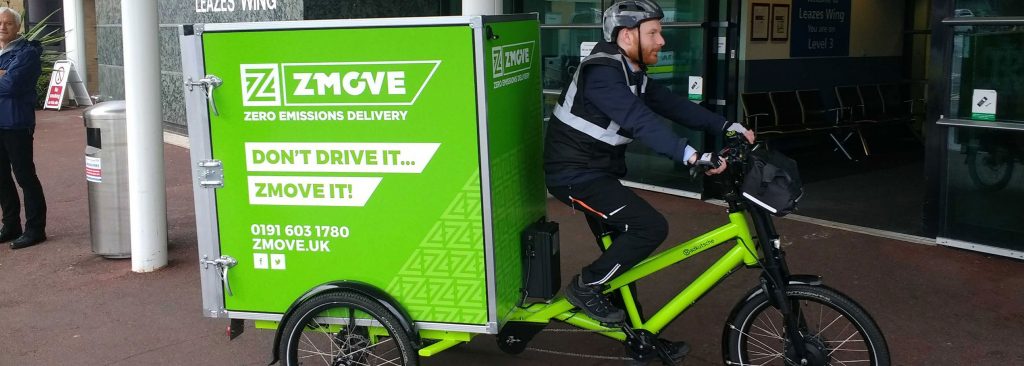Zooming into a greener future: The case for a zero-emissions courier services

The issue
From sample collections for testing to patient record transfers and transporting medicines, the NHS relies on daily courier services to effectively carry out lifesaving work across the country.
This operational necessity is often contracted externally, with transport and deliveries being carried out by diesel van-based services – ultimately resulting in additional pollution, carbon emissions and congestion (with the NHS reportedly generating a total of 3.5% of all road travel in England which is equivalent to 9.5 billion miles).
As part of its pioneering work to tackle the climate and health emergency, Newcastle upon Tyne Hospitals NHS Foundation Trust looked at reliable alternatives which could be used for short journeys, especially within the congested city centre.
The solution
With the impending creation of a Clean Air Zone across Newcastle city centre, the trust trialled an electric cargo bike courier delivery scheme, to temporarily replace an existing diesel van courier service between two city centre hospital sites. An electric cargo bike service replaced nearly 500 miles of carbon-based transport, for a three month trial period from October to December 2019.
The trial service, operated by Newcastle-based ZMOVE, ran for 20 hours a week, transporting medical specimens (in compliant packaging), laundry and other sundries between NHS services across Newcastle city centre.
The service began on schedule, with 25 daily service stops across an eight mile route. The electric cargo bike handled the load volumes required, highlighting the lightly loaded nature of historic van journeys, and was able to easily adhere to schedule timings.
The impact
Even in the short trial period, the impact of using alternative courier methods generated meaningful impact at multiple levels:
- Environmental: First and foremost, carbon savings over the three month period were estimated at 212kg (a saving of nearly 848kg CO2e per annum). In addition, it is estimated the trial helped combat air pollution by reducing carbon oxides emissions by 463g (which would translate to 1.85kg per annum), contributing to the health of the residents of Newcastle.
- Financial: The trial also helped save £6,250 over the three month period (translating to a potential saving of £25K per annum).
- Patient and staff experience: Beyond serving as a visible and tangible ‘climate emergency action’ service adoption, the bike had the added benefit of occupying little parking space in delivery bays – freeing up space for NHS staff and patients.
James Dixon, head of sustainability at Newcastle Hospitals NHS Foundation Trust, noted: “It’s exciting to partner with an innovative local company aligned to our core values of health and sustainability, improving local air quality, as well as meeting our climate emergency challenge by driving down carbon emissions. We’re already hoping to extend this trial further and expand into further zero emission courier routes in the future.”
Over to you!
For trusts with multiple service centres in urban settings with daily repeat courier schedules, zero-emission bike-based courier solutions offer significant daily utility; reducing cost, pollution and occupied vehicle space.
We would encourage you to look for similar sustainable alternatives at your local NHS trusts.
For more information about this initiative, please contact: environment@nuth.nhs.uk
